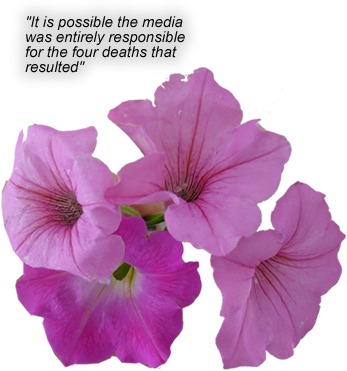Issue # 9 – You…. In Perspective
YOU AND THE MEDIA (part one)
The mass media is first of all a business and, like the sellers of pop and software, the motive is profit. It is marketplace mentality motivating the media and bringing you a product – news, opinions, discussions, entertainment.
The expense of producing a television show, operating a radio station, or producing a newspaper or magazine is very high, but the cost per person reached is small. It is you who the media works diligently to attract and entertain. The bigger their audience, the higher the price merchants will pay for advertising.
It is difficult for a small producer to survive in this business. The “cost per thousand” (the cost per thousand people accessed), the merchant’s chief concern, is less with a large producer than a small one. This principle is true in television, radio, newspapers and magazines. The little guy gets squeezed out, the big guy gets bigger. One of the results of this free enterprise reality, a result of no small concern, is that the ones expressing opinions to the masses become fewer. And therefore more powerful.
The majority of radio stations are owned by a few. About 75 percent of Canada’s newspapers are controlled by only a few companies. The problem of a diminishing number of voices being heard is enlarged when enterprises involve themselves in a cross-section of media outlets.
If you backtracked the source of the many media words daily bathing your mind, the hunt would lead you south of the border as most media content is imported from America. These media words come to you either indirectly through Canadian media – news acquired from United Press, editorials purchased from American newspapers, etc. – or directly through American sitcoms, news reports, movies, soaps.
And just how potent is the effect of the media on society? Perhaps a few examples will make the point…
More than once I heard the story of William Hearst phoning an abrupt order to his syndicate of newspapers: “Puff Billy,” Billy being Billy Graham, the renowned Christian evangelist. Early in Graham’s career, Hearst attended one of his crusades, was impressed, and phoned in the curt order. The ensuing favorable press reports were responsible for lifting Graham’s ministry to a place of prominence. As a result millions have heard the gospel of Jesus Christ over the subsequent decades and found the new life that Christ offers.
Another story. In May 1970 National Guardsmen opened fire upon demonstrating Kent State University students. It is possible the media was entirely responsible for the four deaths that resulted, as well as the destruction of campus property and other lives lost on campuses throughout America. The few radical revolutionaries who instigated the campus unrest were probably surprised by the attention the media gave them. They were actually given a national platform to pour out their venom to America, calling for the destruction of their own society. They were news – not important news because at first they were but a molecule in campus life – but interesting news which translates into dollars. Because of the coverage, the rebellion grew. Increased anarchy meant increased coverage (dollars) which resulted in more anarchy. Each fueled the other. They used the media to spread their revolt, often letting newsman know the time of the next riot, often conveniently prior to the six o’clock news.
The media has a powerful influence on society. They can make or break a politician, repress or inflame a cause, influence the course of society, lead us into or away from war (and even determine the outcome of a war), shape society’s attitudes and appetites. The media has the capacity to do much good and much harm.
To the degree you have relied upon the media – for entertainment, comfort, understanding and information – you have been affected and molded. You live in a society that is what it is largely because of media influence.



